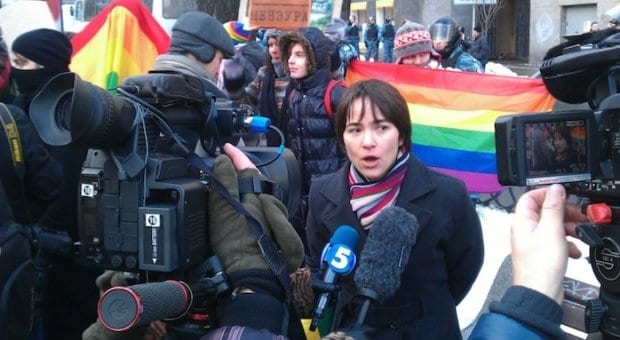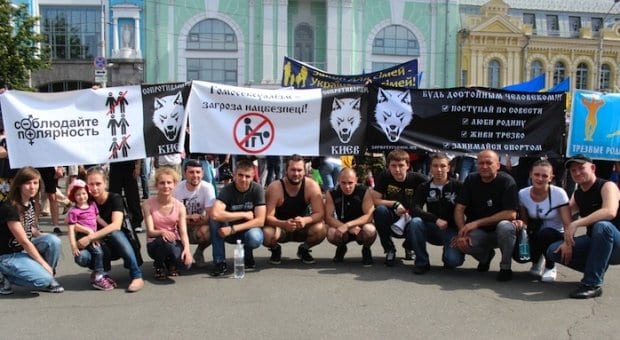
Olena Shevchenko, executive director of the Ukrainian LGBT advocacy organization Insight, at a demonstration against one of two proposed anti-gay propaganda bills in Ukraine, similar to that of Russia. The bills have been stalled and could have imposed prison terms, instead of just fines, as is the case for Russia. Credit: Courtesy of Olena Shevchenko
The largest protests in nearly a decade broke out in Kiev, Ukraine, on the night of Nov 21. Thousands of demonstrators poured into Independence Square, at the centre of the city, with flags and signs, bewildered at a decision their government had made.
That day the Ukrainian government suspended preparations for signing an Association Agreement with the European Union, one that would strengthen economic and trade ties, as well as allow for easier travel between Ukraine and EU member states. It was an agreement that had been negotiated for years, leaving Ukrainians stunned at the government’s about-face. The protests would last for weeks.
Elsewhere in the city, another group was holding a different demonstration. A crowd of about 100 danced in circles around a large balloon with the words “EU=Homo.” At the sound of an announcer, a gap formed in the rings of the circle and a man dressed in traditional Ukrainian clothing walked through, wielding a sabre. He approached the balloon, punctured it and continued stabbing as the large white sphere began to lose its shape, eventually falling onto the ground.
The crowd cheered and resumed dancing. For them it was a victory.
By putting off EU association, Ukraine has delayed economic reform, but it has also sidestepped implementing what has been dubbed “anti-discrimination legislation,” which calls for protection in the workforce based on sexual orientation, a trademark requirement of EU partnership.
Yet without picking a side, Ukraine is caught in a tug of war between the EU and Russia, which is lobbying for its own Customs Union as well as policies that reflect traditional values among former Soviet states.
In a country in which political views are sharply divided, some critics worry that gay rights caught in the middle as political currency will become collateral. “LGBT rights are used to store negative opinions about the European Union,” says Anna Kirey, a researcher of LGBT rights at Human Rights Watch who currently works in Ukraine.
In recent months, billboards featuring slogans such as “Association with the EU means same-sex marriage” and images of same-sex stick figures holding hands have cropped up in city streets. The group responsible, Ukrainian Choice, is among the best-funded groups actively fighting against LGBT rights in the country, according to Olena Shevchenko, executive director of the Ukrainian LGBT advocacy organization Insight.
Yet to their backer, Viktor Medvedchuk, a wealthy businessman and former MP whose end goal is to lobby Ukraine into joining the Russian Customs Union, his organization’s anti-gay rhetoric and attacks are only a means to an end, Shevchenko says.
In fact, on non-LGBT issues — namely EU association — homophobic Ukrainian groups with religious, far right, far left, pro-Russian or nationalist affiliations stand apart.
“It’s really complicated,” says Kirey, who adds that some of the same groups protesting LGBT rights are in favour of the EU. “Russia and pro-Russia political forces in Ukraine needed another issue which could help them create this anti-EU atmosphere.”
Considering that the anti-discrimination legislation is a key source of contention for association proposals, they have found the perfect scapegoat “to use to stir up negative attitudes,” she says.
Currently the country is teetering toward forming closer ties with the EU, but only by a narrow margin. According to October opinion poll figures released by the Ukrainian office of the international research agency IFAK Institut, 50 percent of respondents favoured signing the association and free-trade agreement with the EU, while 48 percent preferred the Russian counterpart, the Eurasian Customs Union.
However, this number contrasts with abysmal support for LGBT rights, on which the European Union stands firm.
According to figures released in May by GfK Ukraine, a market research company, 79 percent of respondents aged 16 and older said they opposed same-sex relationships. More than half surveyed said they would not let gay men and lesbians into Ukraine.
“It is likely the high level of intolerance is caused by the Soviet legacy when homosexuality was deemed a criminal offence and such practices were carefully hidden,” said Inna Volosevych, a senior researcher at GfK Ukraine, in an online statement. “They are kept hidden even now, regardless of the fact that criminal responsibility was withdrawn. The data of the survey confirms that it is necessary to fight the discrimination based on sexual orientation on the legislative level.”
Yet according to Michael Cashman, co-president of the European Parliament’s Intergroup on LGBT Rights, the issue is overblown. He cites two anti-LGBT propaganda laws that were proposed in Ukraine similar to those in Russia, which were ultimately stalled.
“The EU is not an easy game,” he says. “In the debate we had in Parliament on visa liberalization for Ukraine, we were absolutely explicit that . . . if these laws passed, there would be no further liberalization. So we’re being absolutely clear.”
The real issue here, he adds, is Russia’s waning power over former Soviet states and its attempts to maintain control through economic bullying. “It’s why they’re trying to hang on to Ukraine, it’s why they’re hanging on to energy supplies. It’s a multifaceted approach that smacks of desperation, because they see their clout diminishing.”
Not so, says Seva Gunitsky, a political science professor at the University of Toronto who researches post-Soviet states.
To him, Russia’s efforts are an indication that the country feels more confident on the international stage in recent years thanks to being granted the Sochi Winter Olympics and brokering the Syrian chemical disarmament.
On the flipside, the Russian government knows that “it can’t rely on economic performance as a continued basis for its legitimacy,” Gunitsky says, adding that it’s not a stable way to promote connections with citizens. One of the ways it’s trying to gain an alternative source of legitimacy is by asserting traditional Russian values, which are often anti-Western.”
Furthermore, by focusing on cultural issues, the Russian government is trying to obscure the fact that it “operates independently from the will of the people,” he says.
To Kirey, there’s nothing vague about LGBT rights being used as political currency to further Russia’s cause. When the Customs Union was advertised to the Ukrainian public, the discourse portrays Russia as a place where traditional values are preserved, as opposed to the EU, she says.
“For people who are not sure whether they are pro-EU or not, to them it would be a tipping point,” Kirey says. “It was one of the ways to make Ukrainian citizens doubt the necessities of being closer to the European Union.”
“Gay rights are a policy area where public opinion has changed rapidly in recent years, at least in Western countries, and is now out of sync with the position of the Orthodox Church, the Catholic Church, and possibly mainstream Hindu clergy,” says Matthew Glass, a criminology professor at the University of Toronto who studies contemporary Russia. He made reference to India’s recent Supreme Court ruling recriminalizing gay sex and says that this polarization is the reason LGBT rights have taken on symbolic value in recent years.
To Gunitsky, Russia has not budged on its anti-gay policies because international pressure has amounted to little more than cheap talk. If anything, reaction from the West only justifies this behaviour, he says.
“If Russia suffers economic collapse or economic depression, then the West will feel more aggressive in transforming its rhetoric into foreign policy,” he says, adding that countries have too much to lose right now from breaking ties with Russia. “In the end, economic interest will usually override ideological disagreements.”


 Why you can trust Xtra
Why you can trust Xtra


